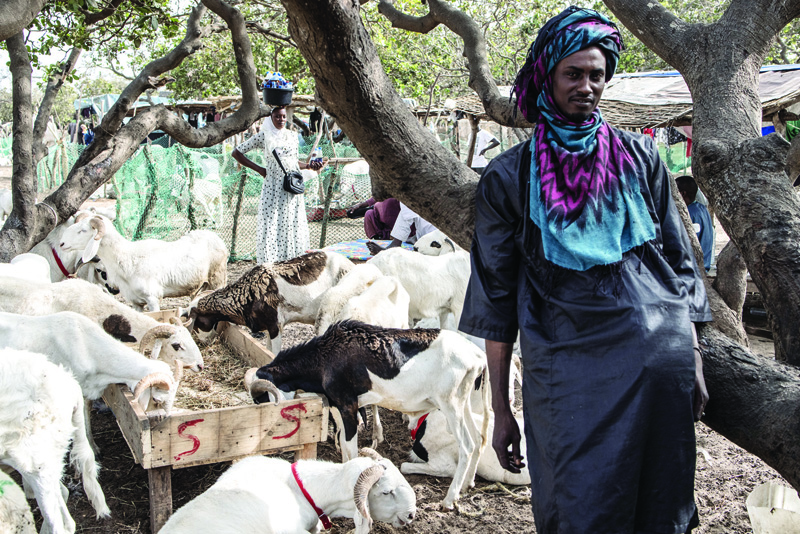 DAKAR: A herdsman keeps watch over his sheep in the Keur Massar sheep market. Thousands of sheep are transported to Dakar ahead of Tabaski (Eid Al-Adha) celebrations. - AFP
DAKAR: A herdsman keeps watch over his sheep in the Keur Massar sheep market. Thousands of sheep are transported to Dakar ahead of Tabaski (Eid Al-Adha) celebrations. - AFPDAKAR: A ram the size of a small pony tosses its head inside a sumptuous pen illuminated by flashing disco lights, before lunging at some ewes half its size. The skittish animal lives on a rooftop in Senegal's capital Dakar, alongside a dozen ewes, in an enclosure featuring ceiling fans, faux chandeliers and multi-colored lighting.
The plush surroundings underscore the deep affection owner Abdou Fatah Diop has for the breed of sheep known as Ladoum, which are native to the West African country. "It's a passion. I forget everything," Diop says of his sheep, adding that he spends more money on them then he does on his family. But the sheep are still money-spinners. Businessman Diop, 40, sells lambs sired by his prize ram to other Ladoum breeders who want to improve their herds, for the equivalent of thousands.
Many are similarly enamored with sheep in the mostly Muslim nation of Senegal, where there are popular television programs dedicated to the animal. The most prized variety are the Ladoum: a smooth-haired breed with curled horns that can reach imposing heights of 1.2 meters (4 feet) or more at the shoulder. A wealthy elite also pays small fortunes for magnificent Ladoum rams to sacrifice during the Islamic festival of Eid Al-Adha-also called Tabaski-which begins next week.
Senegalese breeders only developed the variety over the past 20 years, according to Diop, to accentuate the sheep's proportions and physical beauty. Abou Kane, another top breeder, has dozens of Ladoum tethered under a white tent in the center of Dakar to sell for Tabaski. His clients will pay up to 2 million CFA francs (3,000 euros, $3,600) for a sacrificial animal. "It's an exceptional breed that you can find nowhere else," he says, praising the sheep's "splendor".
'Mystify the neighbors'
Slaughtering flashy rams for Tabaski has become a marker of status in Senegal. But prices are far out of reach for many in the country, where about 40 percent live on less than $1.90 (1.70 euros) a day, according to the World Bank. There is still pressure to buy a good-looking sheep, however. In Dakar's largest ruminants' market, herders in colorful robes stroll among thousands of bleating sheep and goats.
Traders from neighboring Mali and Mauritania have come ahead of Tabaski to serve the city's clientele. The market does a roaring trade over the festival period, according to its president Mamadou Talla, clearing about 150,000 euros ($180,000) a day in sales and supplying half of the 260,000 sheep consumed in Dakar. Talla, 61, said that competing for the nicest sheep is a uniquely Senegalese phenomenon and that customers are picky. "Every Senegalese wants a big ram" the 61-year-old added, which can "mystify" the neighbours and make children happy. Not all sheep are exorbitant. Talla said many go for 60,000 CFA francs (90 euros, $107), for example.
'Crackpots'
Several traders interviewed by AFP said that costs of upkeep and transport justified the seemingly high price of ordinary Tabaski sheep. For the deluxe animals, breeder Abou Kane argued that the rich have a religious obligation to choose the nicest animal. "God demanded of us a sacrifice," he said. "You really shouldn't choose just anything". Some argue that the pursuit of beauty in sheep has little to do with Tabaski, however.
El Hadji Mamadou Ndiaye, an imam at Dakar's Great Mosque, said the rules dictate that the sacrificial animal be of a certain age, among other measures, but say nothing of an animal's size or beauty. Culture, as well as individual vanity, play a role in the market for enormous Tabaski sheep, he suggested. "If you're not a crackpot, you just follow the criteria that are demanded," Ndiaye said. - AFP










